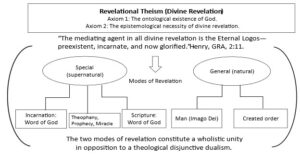By: Jerry Bogacz, PhD Candidate and Retired Biologist | September 10, 2023
Introduction
The New Testament Greek word for revelation (apokalupsis) communicates the idea of making known what has been unknown thereby the recipient becomes “learned” or “having understanding.” God in his sovereignty commands that the “nature, content, and variety [of revelation] are exclusively [His] determination…a free communication by which he alone turns his personal privacy into a deliberate disclosure of his reality.”[1] Divine revelation and authority are the first principles of Christian theology comprising and delivering true Truth and comprised of two modes: special and general. Special revelation has the sub-modes of the incarnational Logos (Jesus Christ) and Scriptures (Word of God). General revelation sub-modes man (the Image of God) and nature (physical creation). The preexistent, incarnate, and now glorified Logos is the sole mediating agent for all modes of revelation.[2] Problematically and historically, the church has emphasized one mode of revelation against the other. Divine revelation must not be reduced to any one mode or sub-mode of revelation. The two modes of revelation are a holistic unity functioning co-operatively.
Modes of Revelation: Special and General

Jesus is special revelation because he is the living Word of God; but He is also general revelation because he is a human being.
Special Revelation: God’s self-disclosure in redemptive history through the inspired Scriptures written by the prophets and apostles by means of angels, dreams, visions, oracles, historical events, wonders, and miraculous guidance. Jesus Christ revealed as Messiah is the culmination of God’s self-disclosure since Jesus cannot be separated from His word.
General Revelation: God’s universal disclosure to all humanity mediated through nature, providential history, and moral law within the heart or conscious of man rooted in the Imago Dei, whereby all persons are informed of God’s existence with a rudimentary understanding of Him as Creator and his moral demands.[3] It is the body of divine truth, though limited and not exhaustive, observable in the physical creation including man.
The eternal Logos is the mediator of both modes of divine revelation to provide unity and guard against two prevalent errors: 1.) reducing all revelation to the revelation found in Jesus of Nazareth and 2.) isolating general revelation by treating revelation outside Jesus of Nazareth as something independent of the Logos who became incarnate. Special and general revelation are authoritative, synergistic, and cooperative. B.B. Warfield declared both modes of revelation “constitute together a unitary whole, and each is incomplete without the other.”[4] Carl Henry responds,
Anyone who denies general revelation also opposes not only the Bible, but also historic Christian teaching…humans are culpable sinners, denying general revelation destroys the basis of moral and spiritual accountability and obscures humankind’s original relationship with God.[5]
The rejection of special revelation characterizes the naturalistic liberal theologies spawned by enlightenment which results in an anthropocentric mediated theology proclaiming the “proper object of faith is not God in his revelation, but man himself believing in the divine.”[6] Orthodox Christianity has historically insisted on the continuity and distinctiveness of general and special revelation. Divine Revelation should not be subsumed by either mode, additionally, the modes should not be wedged against each other.
Romans 1 and General Revelation
The central biblical texts communicating the divine mode of general revelation are Romans 1, Romans 2, Psalms 19, and Acts 17. In this section, the focus will be Romans 1. Paul proclaims his obligation and eagerness “to preach the gospel” that reveals the “righteousness of God.”[7] This righteousness is not simply an attribute of God but a standard of divine judgment.
Verse 18: For the wrath of God is revealed from heaven against all ungodliness and unrighteousness of men, who by their unrighteousness suppress the truth.
God is angry. Paul contrasts the “wrath of God” with the “righteousness of God” from verse seventeen. God directs his anger toward all men for their rebellion against him. The unrighteousness and sinfulness of man suppresses the truth about who God is. The truth is not absent, but man is actively determined to resist the truth. This is an act of man’s will, not of his ignorance.
Verse 19: For what can be known about God is plain to them, because God has shown it to them.
Paul uses aletheia (Greek for truth) in a broad sense. This truth has been revealed and can be known. God’s wrath is directed at their refusal to recognize him as creator and judge. This knowledge of God is not a saving knowledge. But it is knowledge for which he holds man to account.[8] Paul uses the Greek aorist tense for the words translated “can be known” to indicate a definitive act of God giving knowledge about Himself.
Verse 20: For his invisible attributes, namely, his eternal power and divine nature, have been clearly perceived, ever since the creation of the world, in the things that have been made. So, they are without excuse.
Paul is emphatic that the invisible attributes of God’s power and divine character are evidenced in and mediated through all of creation. This is the only New Testament instance of theiotēs, ‘divinity,’ and ‘divine nature.’ The invisible is communicated through the visible:[9]
- God is the loving and sovereign uncreated creator and sustainer of the entire physical and immaterial creation. (Ps. 19:1, Rom. 1:19, Acts 17:22-31, Acts 14:15-16)
- God is self-sufficient, transcendent, immanent, and eternal. (Acts 17: 24-26, Ps. 93:2)
- God has the attributes of greatness (Ps. 8:3-4), majesty (Ps. 29:4), power (Ps. 29:4, Rom. 1:20), wisdom (Ps. 104:24), goodness (Acts 14:17), righteousness (Rom. 1:32).
- God has moral standards that demand man’s obedience and entails his judgment (Rom. 2:15-16).
In Gen.1:26, mankind itself is the greatest evidence of God, being made in His image. David in Psalm 8 says: “What is man that you are mindful of him, the son of man that you care for him? You made him a little lower than the heavenly beings and crowned him with glory and honor.” Man, not only has a knowledge of God’s existence, but specific knowledge of his character. Hence, these truths are self-evident. And God is holding man to account without excuse for his tenacious lack of apprehension and holding back the truth by unrighteousness. God’s wrath is directed at their refusal to recognize him as creator and judge.
Verse 21: For although they knew God, they did not honor him as God or give thanks to him, but they became futile in their thinking, and their foolish hearts were darkened.[10]
The darkened heart entails foolishness lacking understanding and comprehension. In this state of futility and darkness, man will exchange the truth of God for a lie (verse 25). Man is a fool not because he is of questionable intelligence. He is a fool because of his immoral refusal to acknowledge what he knows is true. Man is not seeking God but running away from him. Man’s blind wandering in the dark maze of futile folly produces idolatry and vain speculation. He lives a life of contradiction and instability with his relationship to nature and his fellow man.
General Revelation: Purpose
The two submodalities are the natural creation and man made in the Imago Dei. Man is both a component and recipient of general revelation. Through the creation and our moral conscience, we are “never completely detached or isolated from the revelation of God. Alister McGrath argues, “There is an intrinsic capacity within the created order to disclose God. Here, nature as creation is understood to have an ontologically grounded capacity to reflect God as its maker and originator.”[11] Man with his conscious, cognitive rationality is a sub-modality of the general revelation mode. The Logos in some sense enlightens every person, so that God does not leave the heathen “without a witness” (Acts 17:27). Therefore, man’s “conscience also bears witness” (Rom. 2:15) to the revelation God has granted them. Henry states,
Not even the cataclysmic moral tragedy of the fall has wholly demolished man’s capacity for knowing God and his revealed truth. Scripture emphasizes that God’s general revelation, in nature and in reason and in conscience, penetrates the very mind of man.
General revelation addresses man based on creation and creator/creature linkage. Demarest summarizes well the innate sense of the creator-creature linkage,
Man made in the image of God and enabled by common grace, affably intuits eternal changeless principles, including the existence, character, and moral demands of God… from the light of general revelation, then, all people know God as Creator, Preserver, and Judge of the world.
Grudem rightly adds,
The knowledge of God’s existence and character also provides a basis of information that enables the gospel to make sense to an unbeliever’s heart and mind: unbelievers know that God exists and that they have broken his standards, so the news that Christ died to pay for their sins should truly come as good news to them.[12]
Hence, the primary purpose of general revelation is to point to God’s existence and the ethical component of being accountable to him. Special revelation does not annul general revelation but rather republishes it.
Conclusion
The revelation (general) of God begins with Genesis 1:1, “In the beginning, God created the heavens and the earth.” God is further revealed (special) with John 1:1, “In the beginning was the Word, and the Word was with God, and the Word was God.” God provides a universal revelation in the cosmos and history, a general anthropological revelation in the mind and conscience of man, and to the Hebrews as a chosen people a particular salvific revelation consummated in Jesus Christ as the promised Messiah and head of the church.
About the Author

Jerry Bogacz was born and raised in the Chicago area. Jerry and his wife Kathy relocated to Lexington, Virginia in 2015 where they reside to this day. As a scientist, Jerry worked as a research scientist and project manager in immunodiagnostic and DNA diagnostic product development for Abbott Laboratories in northern Chicago. Jerry is a PhD Candidate in the PhD in Theology and Apologetics program at Liberty University. He graduated from Biola University with two degrees–an MA in in Apologetics and an MA in Science/Religion. He was a resident in 2013 at the C. S. Lewis Fellowship at the Discovery Institute. Also, Jerry received training at the CrossExamined Apologetics training in 2014. Ministerially, he served as a pastoral and teaching elder at Evanston Bible Fellowship in Evanston, IL (2001-2015). Jerry’s primary areas of research are focused around the integration of science and theology, biblical anthropology, bioethics, and worldview studies.
Notes
[1] Carl Henry, God, Revelation and Authority, Vol. 2 (Wheaton: Crossway Books, 1999), 17.
[2] Ibid., 11.
[3] Bruce Demarest, General Revelation: Historical Views and Contemporary Issues (Grand Rapids: Zondervan, 1982), 14.
[4] B.B. Warfield, The Inspiration and Authority of the Bible. Vol 1., The Biblical Idea of Revelation (Chicago: Howard-Severance, 1915), 73.
[5] GRA 2, 10.
[6] Ibid., 2, 120.
[7] Righteousness is to the Hebrew not so much a moral quality as a legal status. The word “righteous” (ṣaddîq) means simply “in the right,” and the word ‘wicked’ (raša) means “in the wrong.”
[8] Anthony Thiselton, Dictionary of New Testament Theology ed. by Colin Brown, 874 – 902.
[9] Bruce Demarest, General Revelation, 242-43.
[10] The message of Romans 1 is repeated in several other Pauline passages: 2nd Corinthians comments on the hardening of the mind; Philippians states human minds are set on earthly things; Ephesians discusses once again the “futility of their minds” and that they are “darkened in their understanding.”
[11] Alister McGrath, A Scientific Theology (Grand Rapids: Eerdmans, 2003), 297.
[12] Wayne Grudem, Systematic Theology (Grand Rapids: Zondervan, 1994), 123.
Other Articles by Jerry Bogacz:
Copyright 2023, BellatorChristi.com.





